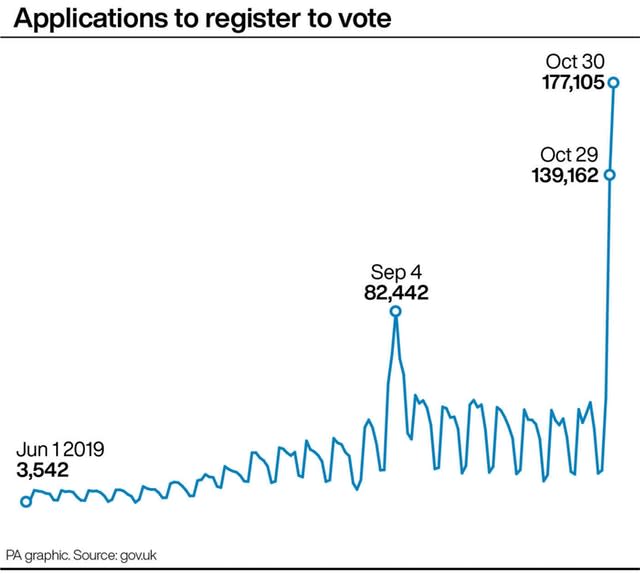Key questions about the December election
Prime Minister Boris Johnson has put the X into Xmas for voters as the UK heads to the polls this winter.
Here the PA news agency answers the key questions around the first December election in almost a century.
– Why is an election being called?
Boris Johnson’s minority Government is far from a majority in the Commons, and the Prime Minister is seeking to bolster his position with a snap election which he hopes will also see off the threat on his right flank posed by Nigel Farage’s Brexit Party.
– Why have the major parties finally agreed on something?
The Liberal Democrats are riding high in the polls at levels rarely seen since the height of “Clegg-mania” in 2010 and are keen to take advantage of that surge.
They joined forces with the SNP, who also want an early General Election, to push for a pre-Christmas poll.
After failing on a number of occasions to force an election under the Fixed-Term Parliaments Act – which requires the backing of two thirds of MPs – Mr Johnson opted to force through a Bill for a December political showdown that needed just a simple majority to succeed.
Labour initially seemed to stall on a December election, but Jeremy Corbyn appeared to recognise the parliamentary numbers were against him, and instead, insisted he relished the prospect of a national poll.

– Will the election campaign be all about Brexit?
Brexit will be a big flashpoint as the major parties have much more pointed policy stances than they did in 2017.
The Tories would be pushing the amended Withdrawal Agreement Mr Johnson secured with Brussels, which all wings of the party have, grudgingly, united behind.
Labour wants to renegotiate that deal and then put the results to a new referendum, and the Liberal Democrats seek to revoke Brexit without the need for a fresh national poll on the issue.
– So, what are the other issues?
As Theresa May found out in 2017, it is easy to lose control of the narrative of an election campaign.
Law and order is likely to figure large as, in his short tenure as premier, Mr Johnson has put his tanks on Labour’s lawn and matched their pledge to fund 20,000 extra police officers.
The NHS and adult social care are also set to be major issues.
– When will I know who is standing in my constituency?
Candidates must register to stand in a seat 19 working days before a general election – so the contenders should become clear around November 15.
– What do the major parties have to fear?
The Brexit Party is likely to try and hammer the Tories over Mr Johnson’s pledge that he would “rather be dead in a ditch” than ask for an EU withdrawal delay beyond October 31.
Labour stormed back from 24 points behind in 2017 to come close to drawing level with the Conservatives in the popular vote, but since then Mr Corbyn’s image has been rocked by his stance on Brexit and rows over how he has handled allegations of anti-Semitism within the party.
After two very shaky general elections, the Lib Dems have a new, untested, leader in the form of Jo Swinson.
– So will Brexit happen once we have had the vote?
Not immediately. But, if the Tories secure a majority they could push through their Withdrawal Agreement Bill (WAB) – House of Lords willing – and under the so-called “flextension” agreed with Brussels the UK could quit the EU on December 31, rather than the currently scheduled exit date of January 31.
However, the European Parliament would also need to ratify the deal before the end of December for this to happen.
– What if there is a hung parliament?
Such a scenario is likely to produce more deadlock. However, with the WAB receiving a healthy majority in its first vote in the current Parliament, such legislation could still pass if the Tories are the largest party.
But, as ever in politics, it all depends on the numbers.
– Will this be the last election for a while?
Given the rollercoaster nature of British politics over recent years, who knows?
However, if a party, or coalition of parties, manages to secure a majority, politicians are likely to want to avoid forcing voters to the polls again so soon after the third general election in four-and-a-half years.
Party leaders are likely to remember Brenda from Bristol’s famous reaction after being told about the 2017 snap election: “Not another one? Oh for God’s sake, honestly, I can’t stand this.”

How do you register to vote?
The easiest way is to apply online at gov.uk. The deadline is midnight on November 26.
How do I cast my ballot?
Polling stations open at 7am on December 12 and close at 10pm.
If you cannot vote in person, you can apply to vote by proxy or have a postal vote.
Postal votes must arrive at the Electoral Office by 10pm on December 12.

 Yahoo News
Yahoo News 
